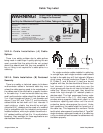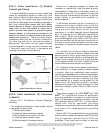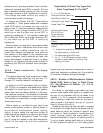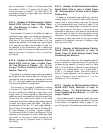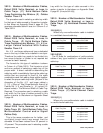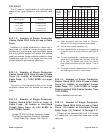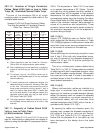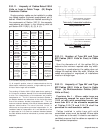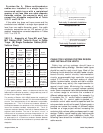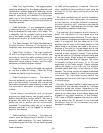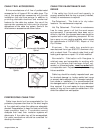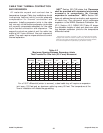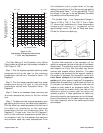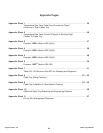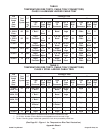
Provision No. 2: Where multiconductor
cables are installed in a single layer in
uncovered cable trays with a maintained
spacing of not less than one cable diameter
between cables, the ampacity shall not
exceed the allowable ampacities of Table
310.71 and 310.72.
If the cable tray does not have covers and the
conductors are installed in a single layer spaced not
less than one cable diameter apart, the cable
conductor ampacities can be 100 percent of the
ambient temperature corrected capacities in Tables
310.71 or 310.72.
392.13. Ampacity of Type MV and Type
MC Cables (2001 Volts or Over) in Cable
Trays. (B) Single Conductor Cables (2001
Volts or Over).
CABLE TRAY WIRING SYSTEM DESIGN
AND INSTALLATION HINTS.
Cable tray wiring systems should have a
standardized cabling strategy. Standard cable types
should be used for each circuit type. Most of the
following circuits should be included; feeder circuits,
branch circuits, control circuits, instrumentation
circuits, programmable logic controller input and
output (I/O) circuits, low level analog or digital
signals, communication circuits and alarm circuits.
Some cables may satisfy the requirements for
several circuit types. Minimizing the number of
different cables used on a project reduces installed
costs. Some companies have cable standards based
on volume usage to minimize the numbers of
different cables used on a project. For example: if a
6 conductor No. 14 control cable is needed but 7
conductor No. 14 control cable is stocked, a 7
conductor control cable would be specified and the
extra conductor would not be used. Following such a
practice can reduce the number of different cables
handled on a large project without increasing the
cost since high volume cable purchases result in cost
savings. Orderly record keeping also helps provide
quality systems with lower installation costs. The
following items should be included in the project's
cable records:
38
Cooper B-Line, Inc Cable Tray Manual
(*) The ambient ampacity correction factors must be used.
(**) At a specific position, where it is determined that the tray
cables require mechanical protection, a single cable tray cover of
six feet or less in length can be installed.
The wording of Section 392.13(B)(3) states that a spacing of
2.15 times one conductor diameter is to be maintained between
circuits. Two interpretations of this statement are possible.
Interpretation #1. - The 2.15 times one conductor diameter is
the distance between the centerlines of the circuits (the center
lines of the conductor bundles). Interpretation #2. - The 2.15
times one conductor diameter is the free air distance between the
adjacent cable bundles. The use of the word “circuit” is
unfortunate as its presence promotes Interpretation #1. An
installation based on Interpretation #1 is not desirable as a free
air space equal to 2.15 times one conductor diameter between
the cable bundles should be maintained to promote cable heat
dissipation.
Mult.
Solid Applicable Amp.
Sec. Cable Unventilated Ampacity Table Special
No. Sizes Cable Tray Tables Values Conditions
Cover (*) By
1/0 AWG No Cover 310.69
(1) and Allowed and 0.75
Larger (**) 310.70
1/0 AWG 310.69
(1) and Yes and 0.70
Larger 310.70
1/0 AWG Maintained
(2) & Larger No Cover 310.69 1.00 Spacing Of
In Single Allowed and One Cable
Layer (**) 310.70 Diameter
Single
Conductors Spacing Of
(3) In Triangle No Cover 310.67 2.15 x One
Config. Allowed and 1.00 Conductor
1/0 AWG (**) 310.68 O.D.
Between
and Larger Cables(***)
Spacing Between Conductors
(2.15 x O.D. of Conductor)
Technically Desirable Installation
Spacing Between Conductors
(2.15 x O.D. of Conductor)
Technically Undesirable Installation
Interpretation #1
Interpretation #2



